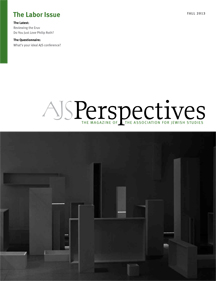Dear Colleagues,
When I was in graduate school, the word on the street was that someone with a PhD had a one-in-four chance of getting a tenure-track job in the academy. I have no idea whether this was an accurate statistic. Professors never discussed the issue, and it was raised only seldom, and with trepidation, among graduate students; it was the proverbial elephant in the room. And apparently this is still the case, even though it seems that the odds of getting such a position may have gotten worse since the 1990s, when I finished my graduate studies. I find that this is a topic neither professors nor students are eager to talk about: when I raise it with graduate students, they generally look aghast—as if, in a remarkable bit of magical thinking, never mentioning the issue somehow wards off the possibility of not getting a tenure-track position. And when I've broached the issue with other professors, they are often dismissive. One assured me that "the best people get jobs." Not only do I know this to be, at best, a partial truth—some of the finest scholars in areas of study with which I am familiar are not in tenure-track positions—but I find such thinking even more disconcerting than the graduate students' taboo.
Some institutions of higher education have begun to confront this challenge by providing workshops or other information for graduate students on alternative careers to the academy. The issue has been addressed on the pages of the Chronicle of Higher Education, at annual conferences of major learned societies, and of course on Twitter at #altac. Jewish Studies needs to engage the question of graduate students' professional futures as well and should do so on multiple fronts. First, graduate students need to be engaged in this topic. One outcome of AJS's recent strategic plan is the commitment to forming a Graduate Studies Committee, involving both students and faculty members, to address a variety of students' concerns regarding the profession in general and AJS in particular. Career planning, broadly defined, should be at the top of this com mittee's agenda. Students need to be encouraged to think proactively and creatively about how their scholarship might relate to how they make a living, whether in the academy or elsewhere.
Moreover, academics who have become tenured faculty need to rethink assumptions that many of them make about those scholars who are situated otherwise professionally. It has been my experience that people with doctorates who do not get tenure-track jobs are often thought of by their former mentors as fallen angels, second-class citizens, or worse. To my astonishment, I once heard a professor remark, when someone mentioned a former student of his—a student who had gone on to pursue a nonacademic career (and a quite impressive one at that)—that training this student had been "a waste of my time." Such thinking is, frankly, destructive. Not only is the pursuit of an advanced degree a rewarding experience in its own right; the investment of time, energy, and money in training a doctoral student should not be considered a "waste" if that student has something to offer to the field, irrespective of his or her livelihood. Professors, and the profession at large, should encourage all their graduates to continue to be actively engaged in scholarship to the extent that they are able and wish to be. Postgraduate professional possibilities, widely defined, should be a subject of ongoing conversation between professors and their graduate students during the course of their education. And faculty need to address the issue among themselves as they think programmatically about the future of graduate training—for example, preparing students for the growing importance of conjoining humanities and technology, within and without the academy.
AJS can support independent scholars by encouraging them to remain active in the field though the Association's annual conference and publications. Conference sessions can be convened to address how scholars working in other venues, such as public cultural institutions or religious education, draw upon their academic training. Professional development workshops can help graduate students think proactively and expansively about career possibilities and about how their graduate training can relate to a variety of professional futures. This issue deserves urgent attention not only because of the tight academic job market, but also in light of the challenges that the humanities face on and off campus. At a time when a bachelor's degree has become commodified, increasingly regarded as nothing so much as an investment in a student's fiscal future, undergraduates are retreating en masse from courses in the humanities and social sciences, which this pecuniary view of higher education has deemed unprofitable. Scholars therefore need to develop new strategies for making the case for the relevance of their profession. This includes rethinking how the work scholars do as researchers and teachers relates to the lives of professionals beyond the academy. This rethinking of what it means to be in the academy is not merely a matter of addressing economic circumstances. Doing so can enhance what scholars offer to their students, both undergraduate and graduate; it can foster greater value of scholarly work in the public sphere, and it can enrich the work of scholars as a learned community.
Jeffrey Shandler
Rutgers University

